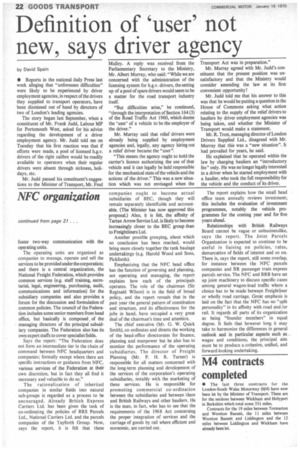NFC organization
Page 24

If you've noticed an error in this article please click here to report it so we can fix it.
continued from page 21 . .
foster two-way communication with the operating units.
The operating units are organized as companies to manage, operate and sell the services to be provided under the corporation; and there is a central organization, the National Freight Federation, which provides common services (e.g. staff training, secretarial, legal, engineering, purchasing, audit, communications and information) for the subsidiary companies and also provides a forum for the discussion and formulation of common policies. The council of the Federation includes some senior members from head office, but basically is composed, of the managing directors of the principal subsidiary companies. The Federation also has its own expert staffs to cover specialist fields.
Says the report: "The Federation does not form an intermediate tier in the chain of command between NFC headquarters and companies; formally except where there are specific instructions or guidance from NFC, various services of the Federation at their own discretion, but in fact they all find it necessary and valuable to do so."
The rationalization of inherited companies in similar fields into natural sub-groups is regarded as a process to be encouraged. Already British Express Carriers Ltd. has been given the task of co-ordinating the policies of BRS Parcels Ltd., National Carriers Ltd_ and the parcels companies of the Tayforth Group. Now, says the report, it is felt that these companies ought to become actual subsidiaries of BEC, though they will remain separately identifiable and accountable. (The Minister has now approved this proposal.) Also, it is felt, the affinity of Tartan Arrow Service Ltd. is likely to become increasingly closer to the BEC group than to Freightliners Ltd.
Another possible grouping, about which no conclusion has been reached, would bring more closely together the tank haulage undertakings (e.g. Harold Wood and Sons, Pickfords).
Emphasizing that the NFC head office has the function of governing and planning, not operating and managing, the report explains how each of the principals operates. The role of the chairman (Sir Reginald Wilson) is in the field of broad policy, and the report reveals that in the past year the general pattern of constitution and structure, and its effectiveness for the jobs in hand, have occupied a very great deal of the chairman's time and attention.
The chief executive (Mr. G. W. Quick Smith), co-ordinates and directs the working of the head-office directorates for finance, planning and manpower but he also has to monitor the performance of the operating subsidiaries. The director of Freight Planning (Mr. P. H. R. Turner) is responsible for all matters concerned with the long-term planning and development of the services of the corporation's operating subsidiaries, Uotably with the marketing of these services. He is responsible for promoting commercial co-ordination between the subsidiaries and between them and British Railways and other hauliers. He is the man, in fact, who has to see that the requirements of the 1968 Act concerning the proper integration of services and the carriage of goods by rail where efficient and economic, are carried out.
The report explains how the small head office team annually reviews investment; this includes the evaluation of investment programmes, notably the vehicle programmes for the coming year and for five years ahead.
Relationships with British Railways Board cannot be vague or unbusinesslike, says the report. The Joint Parcels Organization is expected to continue to be useful in liaising on policies, rates, demarcation of fields of interest and so on. There is, says the report, still some overlap, for instance between the NFC parcels companies and BR passenger train express parcels service. The NFC and BRB have set up joint machinery to discuss specific cases among general wagon-load traffic where a choice has to be made between Freightliner or wholly road carriage. Great emphasis is laid on the fact that the NFC has no "split personality" in its affinity with road and/or rail. It regards all parts of its organization as being "founder members" in equal degree. It feels that however long it may take to harmonize the differences in general outlook and in particular aspects such as wages and conditions; the principal aim must be to produce a cohesive, unified, and forward-looking undertaking.
M4 contracts completed
• The last three contracts for the London-South Wales Motorway (M4) have now been let by the Minister of Transport. These are for the sections between Wickham and Holyport in Berkshire which total some 354miles.
Contracts for the 19 miles between Tormarton and Wootton Bassett, the 11 miles between Wootton Bassett and Liddingt,on and the 12 miles between Liddington and Wickham have already been let.
































































































